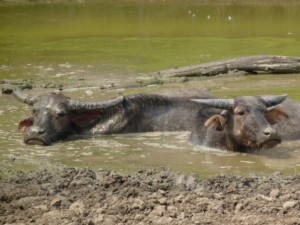Water Buffalo-ing It: Supporting Student Revision
My AP Language students recently began a thematic unit on how work shapes and influences our lives. I knew they were struggling with seeing the theme’s relevance–few of them have jobs and they’re just not there yet. So, today I began class with a poem I thought they’d like: “To Be of Use” by Marge Piercy. We talked about what it means to dive into something headfirst versus “dallying in the shallows” and why “the thing worth doing well done/ has a shape that satisfies, clean and evident.”
The part they seemed to like the most, though, or perhaps they were humoring me because it’s my favorite part, was the water buffalo.
The water buffalo–not a particularly glamorous animal–works through “the muck and the mud to move things forward.”
My students liked that concept, and we talked about the times when we have to “water buffalo it.” (We’re trying to make it catch on as a verb). I have to water buffalo my way through the stack of essays I don’t want to grade this weekend. They have to water buffalo through their swim practice, their homework, their babysitting jobs.
What they don’t know is that they’re about to water buffalo through the writing process.
These kids are highly grade motivated. That’s not to say they aren’t genuinely invested in becoming better writers–some are–but they’re high school kids. I’m going to grade the essay, so they only want my feedback. They want me to read and critique every word of their drafts. Don’t get me wrong–I love writing workshop and I love giving my students tons of feedback, but it can’t just be about me and my feedback. Avondale teacher Rick Kreinbring recently wrote a blog post about the importance of audience for student writers. He explained that when he “became their audience, they tried to write like students. But when their audience was other students, they wrote like writers. They had more confidence, took risks, and tried to engage each other. In short, they did what writers do.”
Writers struggle through “the muck and the mud” with other writers. I’ve given them their muck and mud–an essay assignment linked to our unit’s theme. Now, my job is to figure out how to connect them with other students in genuine conversations to move their writing forward. This isn’t about me shirking my duties as a writing instructor; rather, it’s about helping them realize that there are many writers around them who can provide feedback. They need to ask. They need to trust their instincts. They need to struggle a little.
 Next week, we’ll spend a day in class where they’ll look at their past essays and really read my comments (a girl can dream, right?). Then they’ll talk about those essays with each other and set some goals for this next piece. I’m hoping the goals will be more like “I will make sure my analysis in my body paragraphs directly relates to my thesis” and less like “I will get an A.” We’ll see. One way I hope to get at this is some reflective journaling throughout the process. We’ll set the goals at the beginning of the process, but then I’m going to ask the students to revisit those goals throughout the writing process. What have they done to achieve those goals? What struggles are they having? Hopefully, by asking them to articulate their progress, they’ll begin to realize that they are the ones in control of improving their writing.
Next week, we’ll spend a day in class where they’ll look at their past essays and really read my comments (a girl can dream, right?). Then they’ll talk about those essays with each other and set some goals for this next piece. I’m hoping the goals will be more like “I will make sure my analysis in my body paragraphs directly relates to my thesis” and less like “I will get an A.” We’ll see. One way I hope to get at this is some reflective journaling throughout the process. We’ll set the goals at the beginning of the process, but then I’m going to ask the students to revisit those goals throughout the writing process. What have they done to achieve those goals? What struggles are they having? Hopefully, by asking them to articulate their progress, they’ll begin to realize that they are the ones in control of improving their writing.
After the goal-setting, I’ll set the students loose to write on their own timeline. That’s going to be hard for me. I like to require rough drafts by a certain day. I often schedule students in slots for draft conferences on writing workshop days, and I’ve been known to require different types of peer editing. None of that is bad, but if my goal is to push them to value and engage in the writing process authentically and independently, those types of supports won’t get them there. I’ll model what my timeline would be if I were writing, but I won’t create hoops for them to jump through along the way.
Finally, I plan to offer lots of options to help them seek out the revision support they need.
- Writing Workshop: We’ll still do writing workshop days, but I won’t be reading full drafts. Instead, I’ll encourage them to mine their reflective journal entries for specific questions they can ask me and their fellow writers.
- Google Drive editing: Rather than the required online writing group revision I’ve required in the past, I’ll simply post a sign up sheet on the board. Sign your name; find some buddies who want to collaborate online. As much as I want to lurk and ask them to share their drafts with me, too, I’ll stay out of it.
 Student-led modeling: I often write my own essay along with my students a la Penny Kittle’s Write Beside Them. I love that process; however, this time, I plan to focus on using my student writers to share pieces of their drafts as they go and talk about the choices they’ve made in their writing so far.
Student-led modeling: I often write my own essay along with my students a la Penny Kittle’s Write Beside Them. I love that process; however, this time, I plan to focus on using my student writers to share pieces of their drafts as they go and talk about the choices they’ve made in their writing so far.- Peer to Peer mentoring: My former AP Language students are now seniors. I’ve spoken to them and many are willing to read drafts and give feedback. I’ll invite them to come to my Academic Advisory for the next two weeks and work with interested students.
Oh, my little water buffalos. This should be interesting. Bring on the muck and the mud.
 Hattie Maguire is an English teacher and Content Area Leader at Novi High School. She is spending her fourteenth year in the classroom teaching AP English Language and Composition, English 10, Debate, and Practical Public Speaking. She is a National Board Certified Teacher who earned her BS in English and MA in Curriculum and Teaching from Michigan State University.
Hattie Maguire is an English teacher and Content Area Leader at Novi High School. She is spending her fourteenth year in the classroom teaching AP English Language and Composition, English 10, Debate, and Practical Public Speaking. She is a National Board Certified Teacher who earned her BS in English and MA in Curriculum and Teaching from Michigan State University.

